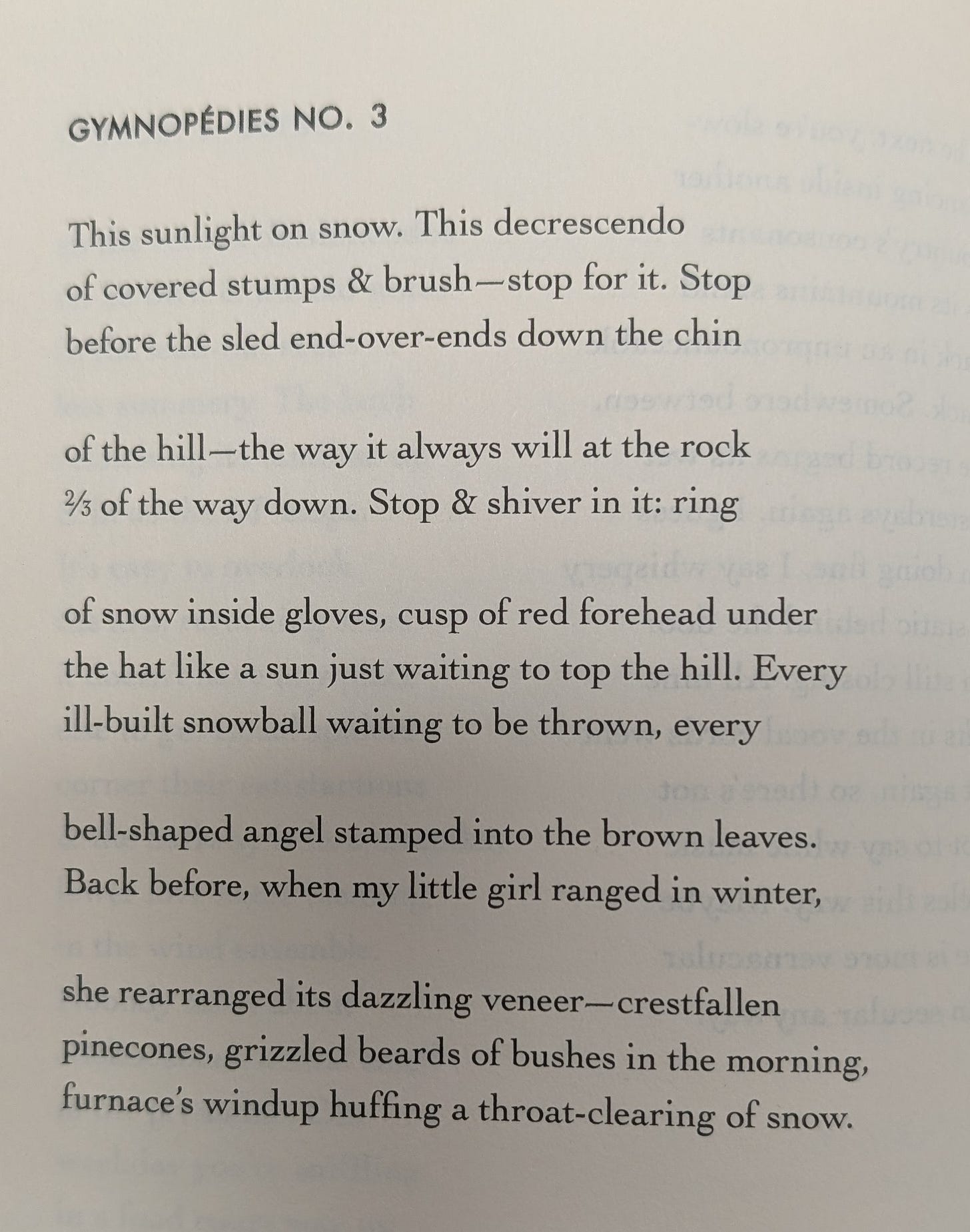Adrian Matejka - Gymnopédies No. 1
That was the week it wouldn't stop snowing. That was the week five- fingered trees fell on houses & power lines snapped like somebody waiting for payday in a snowstorm. That snow week, my little girl & I trudged over the busted branches fidgeting through the snow like empty digits through a hungry pocket. Over the termite- hollowed stump, squat as a flat tire, then up & over the hollow the fox dives into when we open the back door. That week glittered like a Christmas card while we poked around for the best place to stand a snowman. A pinecone-nosed one. One with thumb-pressed eyes to see the whole picture once things warm up.
If you’re a fan and follower of the world of poetry, you probably know Matejka as the first person of color to be the editor-in-chief at Poetry Magazine and the author of 2013’s celebrated collection The Big Smoke. That collection featured poems about the boxer Jack Johnson and was worth all its praise. Jack Johnson, by the by, was a Black boxer from the early 20th century who became the first Black world champion and whose existence so upset White folks at the time that the term “the great white hope” was developed to describe the White boxer James J. Jefferies who came out of retirement in a failed attempt to dethrone Johnson. Naturally, the result led to numerous race riots, a fact that should not surprise you at all considering that having a Black president seemed to have inspired an entire fucking political party and its followers to accept increasingly frequent Nazi salutes at major political events. Sorry—I digress.
This piece appears in Matejka’s equally awesome Somebody Else Sold the World, released in 2021. One of the reasons I particularly enjoy this poem (aside from the sympathetic warm-and-fuzzies I get from poems about dads and daughters) is that it first appeared in Poetry back in 2014 and had several differences in structure and content. I’ve mentioned in some previous write-ups, no doubt, that I really enjoy being able to see a poet work on a seemingly finished piece through future collections. Because I want to speak specifically to this version, I won’t post the previous version but I encourage you to take a look at it here.
The title evokes Erik Satie’s contemplative and haunting piece and sets the tone beautifully for the first line. Shifting the enjambment to follow the word “stop,” Matejka leans into the melancholy of Satie’s work. What wouldn’t stop? I’m not sure, but fuck if I haven’t had a few weeks where it wouldn’t. The second line pulls back the veil, revealing the snowstorm. This highlight is important because the words “week” and “snow” (in all its versions) account for 13% of the poem. Yes, I did the math. This repetition is not exact enough to become a refrain, but it does become a note that carries through the entire piece and ties it together. This is especially useful in a piece that makes use of heavier sounds landing like firm keystrokes of a piano, interspersed with more melodic flows. “fingered trees fell on houses & power/ lines snapped like somebody waiting/ for payday" Good poetry is music, and that is good poetry.
This flow is everywhere in the piece. “Trudged” feeds into “fidgeting,” itself pouring into “digits” and “pocket.” The sonics are so well-developed that I’d rather you just sit with the piece and really pick apart the sounds so as to appreciate them a bit more. I do want to note quickly though that these heavy sounds also do a wonderful job of feeling like crunching footsteps through the snow. The sounds of winter are often as harsh as its temperatures, with cracking and snapping abound. This poem incorporates those sharp sounds to build out its music, adding a texture that helps reinforce and support the images it is building.
Shifting to the tone and content of the piece, that melancholy seems to find root in allusions to some sort of financial hardship. There is a note about “waiting for payday” as well as the “hungry pocket,” which seems to put a double meaning on the cold as not only the absence of heat but perhaps also the absence of funds.
But as the metaphor seems to crescendo at the flat tire, the poem takes an upbeat turn. The week becomes the idealized image of winter represented on Christmas cards. The speaker and his daughter begin to look for a place to build a snowman—creating a life of sorts from the desolation that winter brings. The snowman becomes a retrospective witness who will see the whole picture after the week's difficulty has passed. The speaker understands that life’s trials eventually seem necessary and, weirdly, beautiful once they have gone.
I think next time I’ll take a look at Matejka’s 3rd piece in the set, which I’ll just snap a picture of and attach here for the fun of previewing it a bit.






